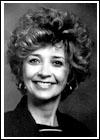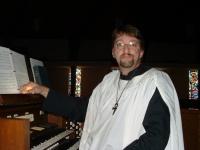Planning worship?
Check out our sister site, ZeteoSearch.org,
for 20+ additional resources related to your search.
- |
User Links
Person Results
Dwight Liles
b. 1957 Topics: Dedication and Stewardship Author of "We Lift Our Voices (We Are an Offering)" in Glory to God
Dwight Liles
Isaiah Jones
b. 1940 Person Name: Isaiah Jones, Jr. Topics: Dedication and Stewardship Author of "Fill My Cup" in Glory to God
Isaiah Jones
George S. Schuler
1882 - 1973 Person Name: George S. Schuler, b. 1882 Topics: Benevolence; Dedication of Life; Stewardship of Life and Talents; The Christian Way of Life Aspiration and Consecration Composer of "[Out in the highways and byways of life]" in Worship and Service Hymnal
George S. Schuler
William Hiram Foulkes
1877 - 1961 Person Name: William H. Foulkes Topics: Dedication and Stewardship Author (sts. 1-3; st. 4) of "Take Thou Our Minds, Dear Lord" in Glory to God Born: June 26, 1877, Quincy, Michigan.
Died: December 9, 1961, Smithtown, New York.
Buried: Smithtown, New York.
Foulkes graduated from the College of Emporia, Kansas, in 1897 and went on to the McCormick Theological Seminary, Chicago, Illinois; he received the Bernadine Orme Smith Fellowship, and studied for a year at New College in Edinburgh, Scotland. He later pastored at Presbyterian churches in Elmira, Illinois; Portland, Oregon; New York City; Cleveland, Ohio; and Newark, New Jersey. He served as General Secretary of the Board of Ministerial Relief and Sustentation (1913-18), as chairman of the New Era Movement, on the General Council of the Presbyterian Church, and as moderator of the General Assembly (1937).
Lyrics:
Gird Us, O God, with Humble Might
Take Thou Our Minds, Dear Lord
--www.hymntime.com/tch/
William Hiram Foulkes
Mary Kay Beall

b. 1943 Topics: Dedication and Stewardship Composer of "GRATUS" in Glory to God Mary Kay Beall was born in Akron, Ohio in 1943. She holds a B.M. degree from Ohio Wesleyan University, an M.A. from Ohio State University, and a Masters in Theological Studies from Trinity Seminary in Columbus, Ohio. She was ordained in the American Baptist church and ministers to church musicians and choirs as well as conducting clinics and reading sessions in the United States and Canada.
NN, Hymnary editor. Source: www.hopepublishing.com/
Mary Kay Beall
James E. Clemens
b. 1966 Topics: Dedication and Stewardship Author of "God, We Honor You" in Glory to God
James E. Clemens
Chung Kwan Park
Topics: Dedication and Stewardship Author of "To My Precious Lord (내게있는향유옥합)" in Glory to God
Chung Kwan Park
Basil Harwood

1859 - 1949 Topics: The Nature of the Church Called to God's Mission; Church Dedication of a Building; Holy Communion; Installation Services; Mission and Outreach; Service Music Offering; Stewardship Harmonizer of "DEUS TUORUM MILITUM" in The United Methodist Hymnal Basil Harwood (11 April 1859 – 3 April 1949) was an English organist and composer.
Basil Harwood was born in Woodhouse, Gloucestershire (the second youngest of 12 children) on 11 April 1859. His mother died in 1867 when Basil was eight. His parents were Quakers but his elder sister Ada, on reaching 21 in 1867, converted to the Anglican Church. Basil was allowed to attend the ceremony at the Church of England in Almondsbury and this is where he was first drawn to organ music and choral singing. His father, Edward, remarried two years later in 1869 to a lady from an Anglican family. Basil was now sent to the Montpellier School in Weston-super-Mare for a year. In 1871, at 12 he was enrolled in Clevedon, the preparatory school for Charterhouse where he was first to formally study music.
He went up to Charterhouse in 1874 and left in 1876 having won a leaving Exhibition to Trinity College, Oxford where he initially studied Classics (1879) and Modern History (1880). He then studied for a further two years, 1881–1882, at the Leipzig Conservatory under Carl Reinecke and Salomon Jadassohn. It was here in 1882, Basil composed his first anthem for chorus and organ "O Saving Grace." He returned from Leipzig to realise that he had now passed the age limit to study music formally.
In 1883, Basil became organist of St. Barnabas Church, Pimlico completing his Sonata in C# Minor here in 1885, selling the copyright to the publisher Schott for one shilling a year or two later. After this success, he then moved to Ely Cathedral in 1887 where he wrote the bulk of Dithyramb, possibly his greatest organ work. His final appointment was as organist at Christ Church, Oxford and as precentor of Keble College, Oxford from 1892 to 1909. Whilst there he co-founded and conducted the Oxford Bach Choir which helped to earn him his degree as Doctor of Music. He conducted the Oxford Orchestral Association (1892–1898).
He was musical editor of the 1908 Oxford Hymn Book and Examiner for Musical Degrees (1900–1925).
During this time, he met and married Mabel Ada Jennings (the daughter of George Jennings) (who had become a pupil of his in 1896) at All Souls St. Marylebone, London (27 December 1899). Mabel had studied music herself, piano and composition, and was also a writer. She may well have composed lyrics for some of his lesser known tunes. At an advanced age she wrote a small volume of collected poems named Questing Soul.
He retired early at 50 (in 1909) after the death of his father, Edward Harwood, from whom he inherited the family estate of Woodhouse having outlived his seven older brothers. Soon after moving in he had a three manual chamber organ built in the library by Bishop & Sons of Ipswich (now in Minehead Parish Church), on which he promptly finished his Sonata in F# Minor. He continued to compose prolifically.
He was a keen walker, and named many of his hymn tunes after local places that he loved to visit, the most notable being the hymn tunes such as Tockington, Olveston, Almondsbury and Thornbury.
In 1936 advancing in years, he let the Woodhouse estate and moved to Bournemouth. Part of the estate, Woodhouse Down, was later sold to his contemporary Robert Baden-Powell who was two years older than he was and who had also attended Charterhouse School, and is used as a Scout Camp to this day.
In 1939, at eighty, he moved to London, taking a flat in Fleet Street. After a long life, he died on 3 April 1949, eight days short of his 90th birthday, at Courtfield Gardens in the Royal Borough of Kensington, London. A memorial service was held in St Paul's Cathedral on 22 April 1949. Mabel survived him, dying shortly before her 103rd birthday on 20 July 1974. He was survived by two sons; Major John Edward Godfrey Harwood (1900–1996) and Basil Antony Harwood (1903–1990) Senior Master of the Supreme Court, Q.B.D. and Queen's Remembrancer.
His remains are interred in St. Barnabas Church, Pimlico and marked by a plaque inset in floor of the chancel, close to where he would have stood to conduct the choir.
He composed cantatas, church music and works for the organ; his Service in A flat, the anthem O how Glorious and the hymn tunes LUCKINGTON ("Let all the world in every corner sing") and THORNBURY ("Thy hand O God has guided"), first used during a festival of the London Church Choir Association, remain in the Anglican repertory.
--en.wikipedia.org/wiki
Basil Harwood
Thurlow Weed

b. 1966 Topics: Dedication and Stewardship Composer of "GUILSBOROUGH" in Glory to God Thurlow Weed is a composer and organist living in Lancaster, Ohio. He was organist for Whitehall United Methodist Church in Whitehall, Ohio (suburb of Columbus) from 1996 until 2011. He is currently affiliated with St Johns' Episcopal Church in Lancaster, Ohio. He also occasionally plays the Mobile Millennium Carillon for events around Lancaster. This is the largest and heaviest of three travelling carillons in North America, and is based just outside Lancaster.
Before moving to Ohio, he had lived his entire life in Key West, Florida, where his father was the minister of a small Bahamian Presbyterian congregation. He was confirmed as an Episcopalian at St. Paul's Church in Key West and served there in numerous capacities, including cantor and sub-organist. At the same time, he served as Minister of Music at St. Peter's Episcopal Church (Key West), a small Bahamian Anglo-Catholic parish. He is Bishop of the Diocese of the West of the Progressive Episcopal Church, and Vicar of St Luke’s Progressive Episcopal Mission in Lancaster, Ohio.
Weed is the composer of numerous hymn tunes in traditional English style. In addition, he has composed an English language Missa Brevis for St. Paul's Church in Key West, and he has completed a Latin Missa Solemnis for general use in Roman and Anglo-Catholic parishes. Compositions also include shape note (Sacred Harp) hymns, and hymns in the English "West Gallery" style. A number of hymn descants and Anglican chants are also available.
Thurlow Weed (excerpted and edited from cpdl.org with permission of Thurlow Weed)
Thurlow Weed
Nylea L. Butler-Moore
Topics: Dedication and Stewardship Arranger of "SANCTUARY" in Glory to God Nylea L. Butler-Moore, the nationally recognized Methodist composer and writer. She is the music director at Trinity United Methodist Church in Idaho Falls, Idaho, and the youth editor of the Church Music Workshop magazine, published by Abingdon Press in Nashville, Tennessee. She also edits Jubilate, a newsletter for Methodist musicians.
She received her bachelor of music from the University of Tennessee in 1982 and a master of church music with a choral conducting emphasis from the Scarrit-Graduate School in 1985. Her interest in music education took her to the Southeastern Massachusetts University for two graduate courses in the Kodaly music education method. With such a solid music preparation, it is no wonder to see her as a leader in the Methodist music circles and, happily for the Roman Catholic scene, for the Catholic churches in the United States.
The charm of her music promises to enhance Catholic liturgy even more now as her compositions become more available to the parish musician through GIA's contining ecumenical spectrum.
http://www.giamusic.com/bios/
Nylea L. Butler-Moore


 My Starred Hymns
My Starred Hymns


